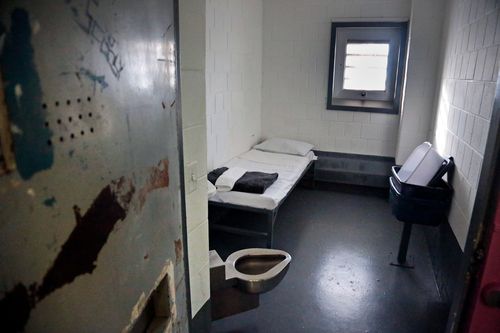New York Governor signs bill enacting restrictions on solitary confinement in state prisons and jails

New York Gov. Andrew Cuomo has signed a bill into law that will enact restrictions on solitary confinement procedures in the state’s prisons and jails, according to the governor’s office.
The legislation, which was passed by the legislature on March 18, puts a 15-day limit on solitary confinement, making New York one of the first states to follow rules adopted by the United Nations known as the Nelson Mandela Rules, according to the New York Civil Liberties Union (NYCLU). It also bans solitary confinement outright for certain vulnerable populations.
Other measures include reserving solitary confinement for “serious conduct” and offering inmates at least four hours of recreation outside their cells and one hour of outdoor time per day.
The law will go into effect a year after its signing.
“Generations of incarcerated men and women have been subjected to inhumane punishment in segregated confinement with little to no human interaction for extended periods of time and many experience emotional and physical trauma that can last for years,” Cuomo said in a news release on Thursday.
“By signing the HALT Solitary Confinement Act into law we are reforming New York’s criminal justice system by helping ensure the effective implementation of proven, humane corrections policies.”
Law sets new rules for solitary confinement
The Humane Alternatives to Long-Term Solitary Confinement Act prevents inmates from being held in solitary confinement for more than 15 consecutive days, or 20 days total in any 60-day period. It also would ban solitary for those with mental or physical disabilities, pregnant women, or those in the first eight weeks of post-partum recovery, and inmates under 21 or older than 55.
While New York law outlines some timelines for how often solitary confinement should be reviewed, there is currently no limit to how long someone can stay there.
Eighteen states had previously enacted statutes that limit or ban solitary confinement, while some states have limited its use through policy, administrative code or court rulings, according to the National Conference of State Legislatures.
The UN’s Mandela Rules define segregated confinement for more than 15 days as torture.
Besides the restrictions on solitary confinement, the bill also requires that solitary be used for only “serious conduct” such as risk of “imminent serious physical injury.” Other measures to protect inmate well-being are also in the bill, like the use of residential rehabilitation units, which comes with supportive services and requires more recreational time.
Opposition to the bill
The bill was opposed by the Correction Officers’ Benevolent Association (COBA), the union for corrections staff in the New York City Department of Correction. The union argued that restricting the use of solitary confinement would lead to increases in violent attacks against correctional officers.
“The Governor should put safety first and refuse to sign this reckless piece of legislation that is only going to further jeopardize the lives of our essential Correction Officers,” said Benny Boscio, the union’s president, in a statement on COBA’s Facebook page before Cuomo signed the bill.
Some legislators strongly opposed the bill, also saying that it would put the safety of correctional officers and inmates at risk.
Republican Sen. Frederick J. Akshar II said he agreed that the state should be trying to rehabilitate prisoners as well as reduce recidivism and have a strong reentry program for inmates completing their terms.
“But we have a responsibility in this body to protect and ensure the safety and security of the facility, of every inmate that finds themselves incarcerated, and equally as important, we have a responsibility as a body to ensure that we are protecting the hardworking men and women that work in these facilities,” Akshar said.
State Sen. Julie Salazar, a key sponsor of the bill, countered this narrative by citing several examples from across the country where a reduction in solitary confinement led to less violence. She said that studies have shown that “the use of solitary confinement has been consistent with dramatic decreases in violence in correctional facilities.”
Another issue raised by Senate Republicans is the potential costs of the bill, as $100 million is proposed in this year’s state budget to support its first year as law. But Salazar said that while there might be some upfront costs, she said some estimates show that the act would save money over the long term.
One analysis from the Partnership for the Public Good, a community-based think tank in Buffalo, says it could save the state and local municipalities around $132 million per year.
NYCLU Executive Director Donna Lieberman celebrated Cuomo signing the bill, saying that “the torture that is long-term solitary confinement will come to an end in New York state.”
“Thanks to tireless advocacy from survivors of solitary confinement, parents of children lost to this inhumane practice, Albany lawmakers, and partner organizations, New York now leads the nation as the first state to codify the UN Mandela Rules into law, which restrict the use of solitary only to exceptional circumstances,” she said in a statement. “Ending mass incarceration requires replacing punishment with rehabilitation, and our state has now taken a much overdue step towards dignity.”